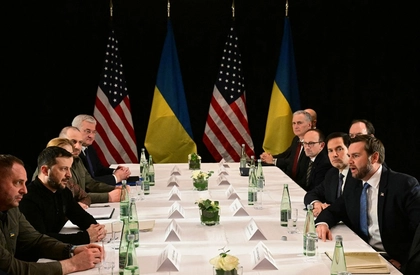While severe frosts could paralyze the Russian army’s current activities on the Ukrainian front, their military command has chosen to give some rather unusual support to their forces.
They recently announced the collection of musical instruments for the benefit of Russian soldiers sitting in trenches and dugouts on the territory of Ukraine.
JOIN US ON TELEGRAM
Follow our coverage of the war on the @Kyivpost_official.
Russian citizens have been asked to donate harmonicas, button accordions, guitars and balalaikas.
The collection points for donating musical instruments in St. Petersburg are the Museum of Military Medicine, the Military History Museum, and the Central Naval Museum.
I would like to know how these musical instruments are going to be delivered to the front line and how they will be distributed.
In the meantime, intercepted telephone conversations between Russian soldiers and their relatives indicate that the front line forces lack both food and warm clothing, but they never mention having time to make music.
Playing instruments may warm the soldiers up, of course. The accordion would be especially effective for that.
Perhaps Ukrainian soldiers will soon hear Russian folk songs and melodies from Soviet films drifting across no man’s land from enemy trenches.
Perhaps, the musical instruments donated to the Russian army will end up as trophies in the hands of Ukrainian soldiers, or perhaps they will remain lying in blood-drenched trenches and become a new "cultural layer" for archaeologists to study in the future.

Munich and After: An Unprincipled Mess
There are a good many sounds that Ukrainian civilians will forever associate with this war. Generally, they have nothing to do with music.
The sound that Ukrainians hear most frequently is that of the air raid siren. Strictly speaking, the siren is musical, but I cannot for the life of me find anything enjoyable in the sound as it drowns out everything except the threat of imminent danger.
The siren sometimes brings to a halt real music performed at the Kyiv National Opera and Ballet Theatre - sending performers and audience down into the underground cloakroom to wait until the all-clear.
The theatre’s opera and ballet companies are about to go off on tour to France and Japan for the holiday season.
They will be able to work, for a while, in normal conditions, uninterrupted by air raid sirens. It is also good that the performers can show off their talents to international audiences.
After all, it is usually the St. Petersburg opera and ballet companies that tour Europe and Japan - the Mariinsky and Mikhailovsky.
But this year, no-one in Europe dares to invite them and Russian companies can tour only inside Russia.
The Mikhailovsky Theater hosted a gala concert of Russian opera and ballet stars on Nov. 29, at which money was raised to help the families of Russian citizens mobilized for the war against Ukraine.
Russian artists may continue to help their armed forces. However, donating a bit of money and some free tickets for the family members of military personnel is not going to solve the Russian army’s problems, as they continue to bite off more than they can chew in their "special operation".
A friend of ours works as a backstage technician at the Kyiv National Opera and Ballet Theater. He’s going to Paris with them.
My wife suggested he take our electric travel kettle with him. Parisian hotels almost never provide tea-making facilities. But at least they do have electricity!
With the ever-present threat of power outages, we have put our electric kettle away and bought one for the gas stove. Listening to our new kettle heating up, I am pleased to note that it has a much quieter and less aggressive sound than our electric kettle.
Three weeks ago, when I was driving toward Kyiv, I was struck by the sudden appearance of a very different sound. The strange noise appeared as soon as we entered Kyiv Region.
Something like the roar of a jet engine, but the most unpleasant thing was that it seemed to be coming from under the car - from the wheels.
"It's the bearings!" – my youngest son told me apprehensively.
I slowed down, but the sound didn't go away.
Nervously, and rather slowly, we reached Kyiv and the next morning I took the car to the service station.
The mechanic smiled oddly when I told him about the noise. "It's resonance," he said. "All the road surfaces around here have been damaged by tanks and heavy tracked vehicles! The sound appeared when you entered Kyiv Region, right?" he added knowingly.
I admitted it had, but just in case, the mechanic checked the wheels. They were all right.
Now I know that the problem is the roads and I have stopped paying attention to the aggressive rumble coming from beneath my car.
I have gotten used to it. More precisely, I have come to terms with one more sound imposed on me by this war.
The views expressed in this article are the author’s and not necessarily those of Kyiv Post.
You can also highlight the text and press Ctrl + Enter











